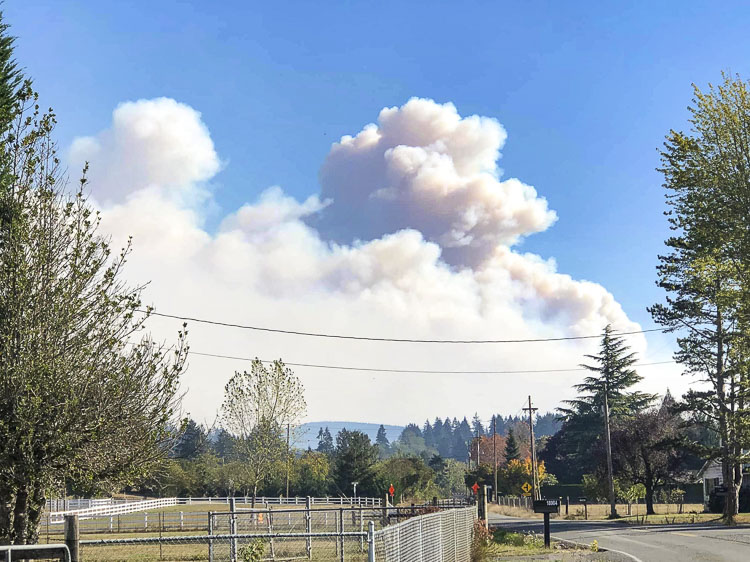
When the air is smoky, even healthy people can have symptoms or health problems
VANCOUVER – Air quality has reached unhealthy levels in parts of Clark County due to smoke from wildfires. Clark County Public Health is urging residents to regularly monitor local air quality and take steps to protect their health while air is smoky.
Air quality in Clark County currently ranges from moderate in Vancouver to unhealthy in north Clark County, according to Washington State Department of Ecology’s Air Monitoring Network. When air quality is in the unhealthy category everyone, especially sensitive groups, should limit time outdoors, avoid strenuous outdoor activities and take steps to keep indoor air cleaner.
Public Health also recommends keeping children indoors and canceling children’s outdoor athletic events and activities when air quality is unhealthy. Schools, child care facilities, before and after school programs and youth sports programs should refer to state Department of Health guidance for protecting the health of children when air is smoky. Organizers of outdoor public events should also consider canceling events when air is unhealthy.
Breathing smoke from wildfires isn’t healthy for anyone, but some people are more likely to have health problems when the air quality isn’t good. People at risk for problems include children, adults older than 65, people with heart and lung diseases, people with respiratory infections and colds, people who have had a stroke, pregnant people and people who smoke.
When the air is smoky, even healthy people can have symptoms or health problems. Symptoms can range from minor irritation to life-threatening complications, including:
- Sore throat
- Headaches
- Burning eyes
- Coughing
- Wheezing
- Shortness of breath
- Chest pain
People with heart or lung diseases should follow the medical management plans created with their health care providers. Those experiencing serious symptoms, such as shortness of breath or chest pain, should seek immediate medical care.
Here are additional steps people can take to improve indoor air quality and protect their health when air is smoky:
- Keep windows and doors closed.
- Create a cleaner-air room in the home using a portable air cleaner with a HEPA filter. Choose a room with no fireplace and few windows and doors.
- Turn the air conditioner in the home and vehicle to recirculate to avoid bringing smoky outdoor air inside.
- Don’t pollute indoor air. Avoid burning candles, using aerosol products, frying food and smoking.
- Do not vacuum unless using a vacuum with a HEPA filter. Vacuuming stirs up dust and smoke particles.
- Seek indoor shelter or public places with monitored air quality if air in the home cannot be improved.
- Use and properly wear a respiratory mask labeled N95, if appropriate. People who must be outside for extended periods of time in smoky air may benefit from wearing one of these masks, if worn correctly. If the mask does not fit properly, it will provide little or no protection and may offer a false sense of security. These masks are not recommended for children or people with beards. People with lung disease, heart disease or who are chronically ill should consult a health care provider before using a mask.
Additional resources:
- Clark County Public Health Smoke from Wildfires webpage
- Washington Smoke Blog
Information provided by Clark Co. WA Communications.
Also read:
- Rep. John Ley supports C-TRAN Bus Rapid Transit to save Washington moneyRep. John Ley praised C-TRAN’s new BRT line as a faster, lower-cost alternative to light rail, urging support for transit options that save taxpayers money and improve service.
- C-TRAN, WSU Vancouver celebrates groundbreaking for The Vine on Highway 99C-TRAN and WSU Vancouver broke ground on the Vine’s Highway 99 route, a 9-mile bus rapid transit line connecting the university to downtown Vancouver and the Waterfront, set to open in 2027.
- Letter: The Charterist III — Concerning the powers of the Legislative BranchJohn Jay continues his Charterist series, arguing that Clark County’s legislative branch is structurally weak and lacks the resources to balance the executive, calling for reform in the next charter review.
- C-TRAN board again postpones vote on light rail operations and maintenance costsThe C-TRAN board again postponed a vote on language regarding operations and maintenance costs tied to light rail expansion, with pending lawsuits involving Michelle Belkot continuing to impact board actions.
- Opinion: ‘Today’s Democratic Party is not our father’s Democratic Party’Editor Ken Vance reflects on how today’s Democratic Party diverges from the values he associates with his father’s generation, citing issues like taxation, gender policies, and shifting ideology in Washington state politics.
- Opinion: ‘The Interstate Bridge project lacks billions in funding from both Oregon and Washington’Lars Larson criticizes Oregon’s funding decisions, highlighting the billions missing from both states for the Interstate Bridge replacement project and calling it a dead-end effort lacking Coast Guard approval.
- Court rules against Save Vancouver Streets A judge has ruled against Save Vancouver Streets in its legal effort to place a street-use initiative on the ballot. The group is considering whether to appeal.











